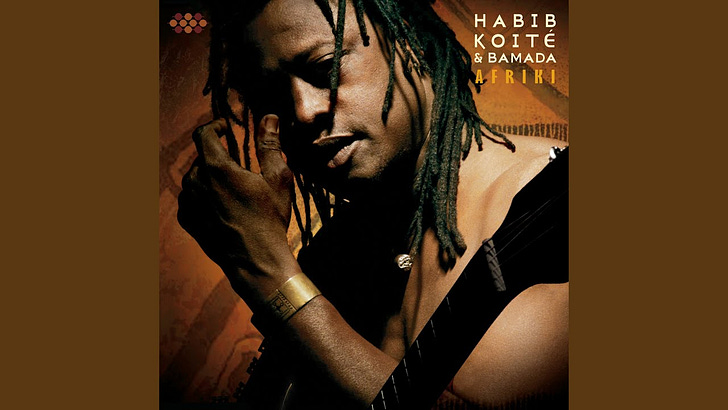In my earlier post, I said I was going to hold off on Namania because I was looking for a song in a language other than Bambara and Wolof. I found a rather jazzy song called Mandjou by Salif Keita in the Sango language1, but I could not find the complete lyrics to it.
Before I talk about this song, a few words on its making. By the way, I am not writing this to garner readers’ sympathies. To the contrary, I am writing to express my dedication to practicing and performing these songs. Just so you understand, I produce these songs, not in some climate-controlled recording studio, but in my apartment. That means a few things in summer-time in New York City:
The high temperature today is 87 deg. F. As I am making this music, I sit in a closed room with both door and window closed to eliminate any outside noise. I am not running an air-conditioner (this particular room doesn’t have one anyway) or my Vornado fan, because that would make a sound as well, which would pollute the recording.
As you might imagine, I’m sweating quite a bit. I use a towel to dry myself. If I don’t do that, I can’t rest my wrists on my computer without leaving a sweat trail or move the mouse on my MacBook Pro trackpad, because my fingertips are sticky and don’t slide on it.
Among the wonders of NYC is the amount of gratuitous noise you hear outside the apartment: fire engines blaring their horns, ambulances and police cars running sirens, city buses emitting low growls, impatient drivers honking to move traffic along so they can make the next light, and to elevate themselves above this fray, you have some folks that have removed the mufflers on their cars and are gunning them and guys on dirt-bikes doing wheelies2. So, in short, quite the cast of characters. Anytime any of these folks are passing by, I need to stop and restart recording.
I do multiple takes of individual lines both to practice for myself and to get them perfect on the recording. So, that’s a lot of recording. And I don’t use an external mic, just the internal one on the laptop. This song took about 4 hours to produce from start to finish, including the learning process. I’m now experienced enough that I can record as I learn.
I found this song to be beautiful as soon as I heard it - I needed no time to know I liked this song and that I wanted to sing it. I love the guitaring on this, the chords and fingering. From the English translation of the lyrics given below, it appears this song is about a little girl, but I can’t vouch for the translation.
I did all of the vocals, including the female backup vocals with falsetto for the most part. There is a portion of the female backup vocals that is quite low in pitch, and I used normal voice for it. Although I don’t usually do this (no reason not to actually), in this particular song, I increased the mid and hi equalizer knobs in GarageBand to maximum and lowered the lo equalizer to minimum for the two backup vocal tracks to make them sound more feminine.
Here’s my rendition:
Here’s the original:
Lyrics
Adapted from here: I listened to the isolated vocals and modified the lyrics according to what I heard, though I’m not sure if that’s correct Bambara.
Ngjena filimin dula sulamamo su filimin dula Kraye tomoro gotololo menyo onte sulaga kunda Ngjena aishe lei dulam sulamamo su aishe lei dulam Kraye tomoro gotololo menyo onte sulaga kunda La ila ilalaaaa Yarafatiaaaa yarafatia La ila i duniya Yarafatiaaaa yarafatia Nimeta milaaaa tamiiii Nivesa gila saagii Gonimeta mila fa taamiii Nivesa gila saagii La ila ilalaaaa Yarafatiaaaa yarafatia La ila i duniya Yarafatiaaaa yarafatia Ain di dala balu goeta kili kili Yarafatiaaaa Orei dut dela salko m'temaaa Yarafatiaaaa Dela finini meimito Yarafatiaaaa Maaaamoooooooooo Yarafatiaaaa Namania e num galome tililine namania Ime ifinni ota soto Namania inya hesor ahoili namania Ime ifinni ota soto Namania i tere eso hameselei namania Ime ifinni ota soto Namania Maaaamoooooooooo nanemaaaaaaa Ime ifinni ota soto Eto mbooooo Namania Ehan galola gjane namania Ime ifinni ota soto Namania Ebulu galola gjane namania Ime ifinni ota soto Korinan te ma Namania Eham galome tililine namania Ime ifinni ota soto Namania E num galome tililine namania Ime ifinni ota soto Namania I tere eso hameselei namania Ime ifinni ota soto Namania I tere eso hameselei namania
Translation
Here it is, but I can’t vouch for its accuracy.
Sango or sangho is spoken in the Central African Republic (capital Bangui), Chad (capital N’Djamena) and DRC (the Democratic Republic of the Congo, capital Kinshasa).
Riding on only the rear wheel by lifting the front wheel in the air.


